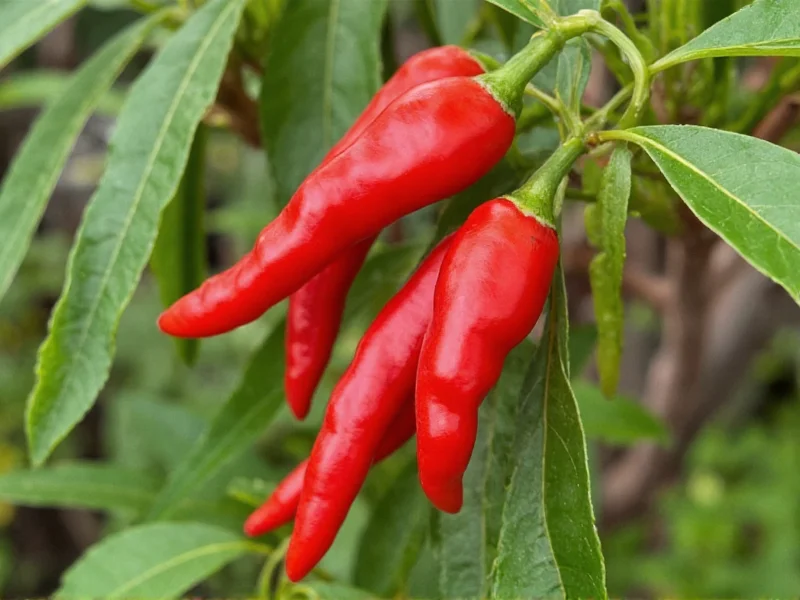When exploring the world of dried chilies, puya chillies stand out as a versatile ingredient that brings both flavor and subtle heat to countless dishes. These slender, deep red peppers offer a unique culinary experience that's become essential in traditional Mexican cooking and increasingly popular among home chefs worldwide.
What Exactly Are Puya Chillies?
Puya chillies (pronounced "pwee-ya") represent a specific variety of dried guajillo pepper harvested at an earlier stage of maturity. This early harvest creates notable differences from standard guajillos:
- Size and shape: Typically 3-4 inches long with a slender, tapered form
- Color: Bright brick red to deep crimson (darker than standard guajillos)
- Texture: Thinner skin with less flesh compared to mature guajillos
- Heat level: Slightly hotter than regular guajillos at 500-2,500 Scoville units
Despite common confusion, puya chillies aren't a separate pepper species but rather represent guajillo peppers (Capsicum annuum) harvested before full maturity. This early picking preserves more capsaicin, explaining their slightly elevated heat level compared to standard guajillos.
Flavor Profile and Heat Characteristics
Understanding puya chillies' flavor profile helps maximize their culinary potential. When properly prepared, they deliver:
- A pronounced berry-like sweetness reminiscent of cranberries or cherries
- Subtle tea-like notes with earthy undertones
- Mild to moderate heat that builds gradually
- Floral hints that distinguish them from other dried red chilies
Compared to similar dried chilies, puya peppers sit between ancho and standard guajillo peppers on the flavor spectrum. Their heat level makes them accessible for those sensitive to spice while still providing noticeable warmth.
| Dried Chili Variety | Scoville Heat Units | Primary Flavor Notes | Best Culinary Uses |
|---|---|---|---|
| Puya | 500-2,500 | Berry, green tea, floral | Sauces, stews, marinades |
| Guajillo (standard) | 2,500-5,000 | Tangy, berry, tea | Moles, adobos, salsas |
| Ancho | 1,000-2,000 | Chocolate, raisin, coffee | Moles, braises, rubs |
| Chipotle | 2,500-8,000 | Smoky, tobacco, wood | Barbecue, beans, stews |
Optimal Culinary Applications for Puya Chillies
Chefs value puya chillies for their balanced flavor that enhances dishes without dominating them. The most effective culinary applications include:
Sauce Preparation Techniques
For authentic Mexican sauces, follow these professional preparation steps:
- Remove stems and seeds using kitchen shears
- Toast peppers lightly in a dry skillet for 20-30 seconds per side
- Soak in hot water for 15-20 minutes until pliable
- Blend with garlic, cumin, and other spices until smooth
- Strain through fine mesh sieve for silky texture
This preparation method maximizes flavor extraction while minimizing bitterness. The resulting sauce works beautifully in traditional dishes like:
- Enchilada sauces (particularly red enchilada sauce)
- Chile colorado (beef stew)
- Adobo marinades for meats
- Salsas rojas for tacos and burritos
Substituting Puya Chillies When Unavailable
When puya chillies aren't accessible, understanding appropriate substitutes prevents recipe failure. Consider these alternatives based on your specific needs:
Best Flavor Matches
- Standard guajillo peppers: Use 1:1 ratio but expect slightly less heat and more pronounced tea notes
- Ancho peppers: Use 1:1 ratio for milder dishes with richer, fruitier flavor
- Pasilla peppers: Use 1:1 ratio for earthier, less sweet alternative
When Adjusting Heat Levels
- For more heat: Combine guajillo with a small amount of cayenne or arbol chili
- For less heat: Blend ancho with a touch of bell pepper
Remember that substituting dried chilies requires recipe adjustments. Puya's unique berry notes don't translate perfectly to other varieties, so taste as you go when experimenting with alternatives.
Proper Storage and Preparation Methods
Maximizing puya chillies' shelf life and flavor requires proper handling techniques:
Storage Guidelines
- Store in airtight container away from light and moisture
- Keep in cool, dark pantry (not refrigerator)
- Properly stored, they maintain quality for 6-12 months
- Check for mold or musty odors before use
Preparation Tips
Avoid common mistakes that compromise flavor:
- Never soak in boiling water (causes bitterness)
- Toast gently without scorching (enhances flavor without burning)
- Remove all seeds and white membranes for smoother texture
- Blend while warm for optimal emulsification
Nutritional Benefits of Puya Chillies
Beyond their culinary value, puya chillies offer notable nutritional advantages. A single ounce (28g) serving provides:
- Approximately 20 calories
- Rich in vitamin A (40% of daily value)
- Good source of vitamin C and potassium
- Contains capsaicin with potential metabolic benefits
- Provides dietary fiber (2g per serving)
Research suggests capsaicin, the compound responsible for chili heat, may support healthy metabolism and provide anti-inflammatory benefits. While puya chillies contain less capsaicin than hotter varieties, they still deliver these advantages with more approachable heat levels.
Where to Find Authentic Puya Chillies
Locating quality puya chillies requires knowing what to look for:
- Specialty Mexican grocery stores typically carry them
- Reputable online spice retailers offer the best quality
- Look for deep red color without dark spots or mold
- Fresh puyas should feel slightly pliable, not brittle
- Avoid packages with excessive dust or broken pieces
When selecting puya chillies, trust your senses. They should emit a pleasant, slightly fruity aroma when opened. Avoid any with musty smells or visible moisture, as these indicate poor storage conditions that compromise flavor.











 浙公网安备
33010002000092号
浙公网安备
33010002000092号 浙B2-20120091-4
浙B2-20120091-4